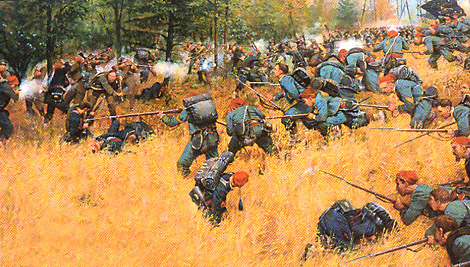This
story was originally published in the 1993 June/July edition
When the Union was in peril the call was answered by
The
Sons of Old Monroe
by Brian
Bennett 
Into the
Wilderness by Keith Rocco. May 5, 1864 found the Federal Army of the Potomac in
a desolate area known as the wilderness. The 140th charged across Saunders Field,
a corn-stubbled clearing. Of the 529 men who entered the battle, the 140th lost
268 killed, wounded or captured. (Painting courtesy of Americana House, Chicago,
Ill.) It would be an embarrassment to Rochester and
“Old Monroe” not to meet its share with volunteers.
1862 had not been a great year for the Union Army. In April, recruiting offices
were closed in anticipation of an early victory. In May, however, Gen. Robert
E. Lee took charge of the Confederate Army and by mid-summer, after the second
battle of Bull Run, was threatening Washington, D.C. President Lincoln sent out
an urgent call for more troops.
The pride of Rochester and Monroe County
was at stake. The upstate New York community had faithfully answered previous
calls, but accompanying the order for 300,000 more volunteers in the summer of
1862 was the news that for the first time, if necessary, the numbers would be
filled by a draft. The share for Monroe County was over 1,500, and local officials
decided to raise an entire infantry regiment towards that quota. The citizens
of Monroe County and Rochester took great pride in their patriotism and support
of the war effort. It would be an embarrassment to Rochester and “Old Monroe”
not to meet its share with volunteers. Aug. 18, the Military Committee
of Monroe County designated recruiting officers for a new infantry regiment. Over
200 men applied for those positions and more than 40, mostly professionals and
businessmen, were selected. To these men went the task of raising the 1,000 man
regiment: 10 companies of 100 men apiece. To the top recruiters went the 30 line
officer's commissions; each company would field a captain and two lieutenants.
The recruiting task was aided by a city proclamation closing all businesses at
3:30 p.m. each day for 10 days. Factors other than patriotism were stirring
the pot. On the 19th the Monroe County Board of Supervisors announced that it
would offer a $100 bounty to enlistees. Combined with state and federal bounties,
the total reward for a recruit came to $252. One newspaper calculated it to be
“almost equal to a mechanic's yearly pay.” Aug. 22, the Military
Committee appointed one of its own members, Louis Ernst, as the regiment's lieutenant-colonel.
The portly 37-year-old was a native of Baden, Germany, and was a co-owner of a
city hardware store. The committee had urged him to take the regiment's colonelcy,
but Ernst refused. He accepted the appointment as second-in-command on the condition
that an officer with a military education, who was already in the service, took
charge of the regiment. The recruits would be housed at Camp Fitz John
Porter, named after the general commanding the Fifth Corps, which at the time
included Rochester's 13th infantry. The grounds were located in the city's southern
portion, a carriage ride away from downtown, on the bluffs overlooking the Genesee
River's west bank. Camp Porter was quite extensive, consisting of mess houses
for each company, a guard house, quartermaster building and cook house. Wells
were sunk for drinking and cooking water, while the river was reserved for bathing.
1
Home |
Next
According
to WebCounter you are the  person to answer the Clarion Call
person to answer the Clarion Call
©2008 Clarion Publications, Inc. All
Rights Reserved.
This site designed by Clarion Communications. | |

